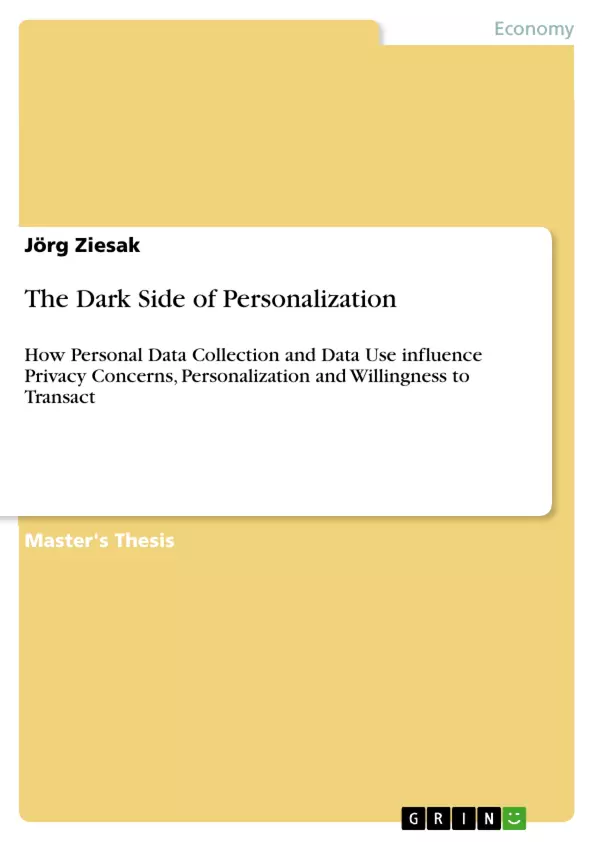“Online Privacy Fears Stoked By Google, Twitter, Facebook Data Collection Arms Race”, “Your E-Book Is Reading You”, ""Instant personalization" brings more privacy issues to Facebook”. These are only a few recent examples of media headlines dealing with the issue of online privacy and personalization. Scholars and managers have repeatedly stated the benefits of personalization, which is targeting products and services to individual customers and constitutes a key element of an interactive marketing strategy. To be able to accurately estimate the needs and wants of customers, it is necessary to gather a significant amount of information. Privacy concerns may arise when personal information about customers are gathered. If this arises, personalization can backfire by making clients reluctant to use the service or - even worse - developing a negative attitude towards the company. A recent survey by Opera Software (2011) found, that Americans fear online privacy violations more than job losses or declaring personal bankruptcy. This had induced politicians to introduce regulations and laws that address online privacy that safeguard consumers against online monitoring and intrusion into confidential user information. However, privacy online remains a complicated issue for both, managers and politicians, because new personalization technology emerges at a much faster pace than political regulations and guidelines. This study establishes a link between different types of data collection, data usage and concerns for information privacy. It also analyses the impact of privacy concerns on value, risk and usability perception of personalization and the users’ willingness to transact with the website. It develops a conceptual framework and tests it by collecting responses to a questionnaire from an online-crowdsourcing sample of Amazon Mechanical Turk.
Inhaltsverzeichnis (Table of Contents)
- Introduction
- Literature Background
- Personalization vs. Customization
- Personalization in an Online Marketing Environment
- Conceptual Framework and Hypotheses
- Privacy Concerns and CFIP
- Control of Personal Data and CFIP
- Data Gathering Method - Overt and Covert Approach
- Use of Data - Authorized Primary Use or Unauthorized Secondary Use
- Willingness to Transact
- Customers' Value of Online Personalization
- Risk Beliefs of Online Personalization
- Perceived Usefulness of Online Personalization
- Moderating Role of Trust Beliefs between Use of Data and CFIP
- Research Design
- Data Collection Process
- Sample Description
- Questionnaire Design
- Measures
- Scale Validity and Reliability
- Data Analysis and Results
- Model Evaluation
- Main Effects and Path Coefficients
- Indirect Effects
- Moderation Analysis
- Discussion and Conclusion
- Theoretical Implications
- Managerial Implications
- Limitations and Future Research
Zielsetzung und Themenschwerpunkte (Objectives and Key Themes)
This study aims to explore the relationship between different methods of data collection, data usage, and concerns about information privacy. It investigates how these privacy concerns affect perceptions of value, risk, and usability of personalized online experiences, ultimately influencing users' willingness to engage with websites.
- Impact of data collection and usage on information privacy concerns
- Influence of privacy concerns on user perceptions of personalization value, risk, and usability
- Relationship between perceived value, risk, and usability and user willingness to transact
- Development and validation of a conceptual framework to explain the connections between these factors
- Exploration of the potential moderating role of trust in the relationship between data use and privacy concerns
Zusammenfassung der Kapitel (Chapter Summaries)
The study begins by establishing a foundation of literature on personalization and its role in online marketing. It introduces the concept of privacy concerns in relation to information privacy and control over personal data. The study then develops a conceptual framework and outlines hypotheses to explore the influence of different data collection and use methods on privacy concerns, perceptions of value, risk, and usability, and ultimately, users' willingness to transact.
The research design section describes the data collection process, the sampling method employed, and the construction of the questionnaire. It provides details on the measures used, scale validity and reliability, data analysis methods, and the evaluation of the model developed. The study then presents the main effects and path coefficients derived from the data analysis, followed by an examination of indirect effects and the moderating role of trust.
Schlüsselwörter (Keywords)
This study focuses on the impact of personalization strategies on information privacy and user behavior in online environments. Key concepts include privacy concerns, online data collection, unauthorized secondary use of data, user willingness to share information, and willingness to transact. The study explores how different data collection and use methods influence users' perceptions of value, risk, and usability, ultimately impacting their willingness to engage with websites.
Frequently Asked Questions
What is the "Dark Side" of online personalization?
It refers to the privacy concerns and negative consumer attitudes that arise when personal data is collected extensively for marketing purposes.
How does data collection affect user trust?
If data collection is covert or used for unauthorized secondary purposes, users perceive higher risks and are less willing to transact with the website.
What is the difference between Overt and Covert data gathering?
Overt gathering is transparent to the user, while covert gathering happens in the background without explicit user awareness, often causing more privacy fears.
What influences a user's willingness to transact online?
Willingness is determined by the perceived value of personalization balanced against privacy risks and the usability of the service.
Why is political regulation struggling with online privacy?
Personalization technology emerges at a much faster pace than laws can be introduced, leaving managers and politicians in a complicated regulatory gap.
- Quote paper
- Jörg Ziesak (Author), 2012, The Dark Side of Personalization, Munich, GRIN Verlag, https://www.grin.com/document/201663



